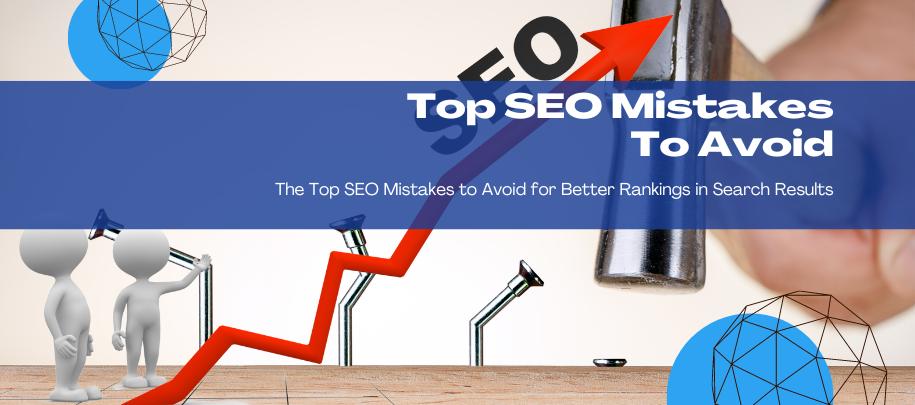SEO is essential for increasing the visibility of your website and bringing in organic traffic. However, it’s essential to understand that not all SEO practices are equal. Certain mistakes can harm your rankings and hinder your online success.
In this blog, we will explore the top SEO mistakes to avoid for better rankings in search results. You can optimize your website and drive sustainable organic traffic by avoiding these pitfalls.
Top SEO Mistakes To Avoid For Better Search Ranking
1. Ignoring Keyword Research
One of the most common SEO mistakes is needing more proper keyword research. Failing to identify relevant keywords with high search volume and low competition can hinder your ability to rank well in search results.
Conduct thorough keyword research to understand the terms and phrases your target audience uses to find similar products or services. Use keyword research tools to discover valuable keywords and incorporate them strategically into your website’s content.
2. Overlooking On-Page Optimization
On-page optimization is crucial for signaling search engines about the relevance and quality of your website. You need to optimize page titles, meta descriptions, headings, and content for target keywords to ensure your visibility in search results.
Ensure that each page on your website is properly optimized with relevant keywords, unique and descriptive meta tags, and well-structured headings. This increases your chances of ranking better by improving search engines in understanding your content.
3. Neglecting Quality Content
Any effective SEO strategy must start with content. You must produce high-quality, informative, engaging content to impact your rankings positively. Avoid thin, duplicate, or keyword-stuffed content. Instead, focus on creating valuable and relevant content that resonates with your target audience.
Incorporate target keywords naturally and provide comprehensive information that satisfies user intent. Quality content attracts organic traffic, encourages backlinks, and signals search engines about your website’s authority.
4. Poor Website Structure And Navigation
A poorly structured website with complex navigation can confuse users and search engines. If search engines need help crawling and indexing your website’s pages, it can hinder your rankings. Ensure your website has a clear and intuitive navigation structure that allows users and search engines to find and access your content easily.
Use descriptive anchor texts, create a logical hierarchy with categories and subcategories, and implement internal linking to enhance the overall user experience and improve search engine crawlability.
5. Lack Of Mobile Optimization
With the rise in mobile usage, paying attention to mobile optimization can benefit your SEO efforts. A website that isn’t mobile-friendly provides a poor user experience and receives lower rankings in mobile search results.
Optimize your website for mobile devices by using responsive design, ensuring fast loading times, and optimizing content and images for smaller screens. A mobile-friendly website improves user engagement, reduces bounce rates, and signals search engines about the quality of your site.
6. Neglecting Technical SEO
Technical SEO encompasses various aspects, including website speed, crawlability, indexability, and site architecture. Ignoring technical SEO can result in poor rankings and decreased visibility. Regularly conduct technical audits to identify and fix broken links, duplicate content, missing meta tags, or slow-loading pages.
Optimize your website’s performance, ensure proper XML sitemap and robots.txt implementation, and fix any crawl errors to improve search engine accessibility and enhance user experience.
7. Ignoring Local SEO
For companies looking to target a particular area, local SEO is essential. Failed opportunities to draw local clients can result from failing to focus on local SEO. Optimize your website for local searches by including location-specific keywords in your content, meta tags, and headings.
Create a Google My Business listing and ensure your NAP (name, address, phone number) is consistent across all online directories. Encourage positive customer reviews and engage with your local audience through local guides and community platforms. Implementing local schema markup can also enhance your local SEO efforts.
8. Neglecting Backlink Quality And Diversity
Backlinks play a significant role in SEO, but focusing solely on quantity rather than quality can be detrimental. Obtaining low-quality or spammy backlinks can lead to penalties from search engines. Instead, prioritize building high-quality and relevant backlinks from reputable websites in your industry.
Seek opportunities for guest blogging, influencer collaborations, and earning natural backlinks through valuable content. Diversify your backlink profile to ensure a natural and authoritative link profile.
9. Forgetting About User Experience (UX)
User experience is a crucial factor in SEO success. A website with poor user experiences, such as slow loading times, intrusive ads, or confusing navigation, can result in high bounce rates and lower rankings.
Optimize your website’s loading speed, ensure it is mobile-friendly, and create intuitive navigation. Ensure your content is easy to read and engaging, with clear calls to action. Prioritize user satisfaction and provide a seamless browsing experience to improve your rankings.
10. Neglecting Regular SEO Audits And Updates
Since SEO is a continuous activity, upgrades and audits must be conducted frequently. Failing to monitor and adapt your SEO strategy can result in missed opportunities and decreased rankings. Conduct regular SEO audits to identify areas for improvement, such as outdated content, broken links, or outdated optimization techniques.
Stay updated with algorithm changes and SEO best practices to ensure your website remains optimized for better search rankings.
Conclusion:
Avoiding these top SEO mistakes is essential for achieving better rankings in search results. By conducting thorough keyword research, optimizing on-page elements, creating quality content, improving website structure and navigation, prioritizing mobile optimization, addressing technical SEO issues, focusing on local SEO, building high-quality backlinks, prioritizing user experience, and regularly auditing and updating your SEO strategy, you can enhance your website’s visibility, attract organic traffic, and achieve long-term SEO success.
Remember, SEO is an ongoing process, and staying informed about industry trends and best practices is crucial for maintaining and improving your search rankings.
Proponent Technologies has professional and experienced team digital marketing experts that enable your website to reach the new heights with latest SEO techniques. If you want to hire us, you can reach us on our contact details. We can guide you through the complete process of Search Engine Optimization (SEO) techniques.
To get a free quote, you can email us at: info@proponenttechnologies.com
Or you can call us at: +91 7017 374 621, +91 6397 593 103
Related Blogs
The 10 Best Programming Languages for AI Development
Artificial Intelligence (AI) is a name that is echoing everywhere. Every other news article, blog, and press release is regarding AI. It seems that everyone wants to sail in the boat of artificial intelligence and streamline their work processes. As per reports, the...
How to Do Distributed Testing Using JMeter in WooCommerce?
Performing distributed load testing with JMeter in a WooCommerce environment enables you to efficiently simulate heavy user traffic across multiple machines, enhancing the scalability testing of your online store. Here's a streamlined approach to set up and execute...
How to do Black Box Testing in WooCommerce?
Black Box Testing is essential in every software application. It is one of the methods of software testing where the internal structure or code is not known to the software tester performing Black Box Testing. The tester will just need to be aware of the application's...




